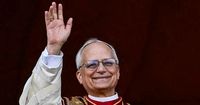The papal conclave has concluded, and the Catholic Church has welcomed its first-ever American pope: Cardinal Robert Francis Prevost, now known as Pope Leo XIV. Announced on May 9, 2025, the 69-year-old Chicago native is making headlines not only for his historic election but also for the mixed reactions he has elicited from social media users and political commentators alike.
Pope Leo XIV’s election marks a significant moment in the history of the papacy, as he is the first pope born in the United States. This milestone has sparked a flurry of online commentary, blending humor with serious reflections on what this new leadership means for American Catholics. Chicago Mayor Brandon Johnson took to social media to congratulate the new pontiff, posting, “Everything dope, including the Pope, comes from Chicago! Congratulations to the first American Pope Leo XIV! We hope to welcome you back home soon.”
Social media has been abuzz with jokes and memes, particularly focusing on Chicago’s famous deep dish pizza and the popular television show "The Bear." One user humorously remarked, "Smart play for the Vatican to go with an American Pope to avoid tariffs," while another quipped about the culinary implications of introducing deep dish pizza to the Vatican. These light-hearted reactions underscore the pride many Chicagoans feel about their connection to the new pope, despite some criticisms about the lack of an English address during his first speech.
When Pope Leo XIV addressed the crowds in St. Peter’s Square on the evening of May 8, he spoke in Italian, Spanish, and Latin but notably avoided English altogether. He sent greetings to his former diocese of Chiclayo in Peru but did not mention his hometown of Chicago. This choice has led to speculation about how he will engage with American Catholics moving forward. Traditionally, popes have been viewed as distant figures, often speaking through translators and addressing the public in languages that may not resonate with their audience.
However, Pope Leo XIV’s background as a native speaker of American English with a mild Chicago accent could change the dynamics of papal communication. His ability to speak directly to American Catholics without the barrier of translation means that his messages will be clear and accessible. This shift could signal a new era in which the pope’s words are not only heard but understood in a way that resonates deeply with the American public.
As observers look to the future, questions arise about how Pope Leo XIV will navigate the complex landscape of American politics and societal issues. His choice of the papal name Leo XIV is particularly telling, as it recalls the legacy of Pope Leo XIII, who was known for advocating workers’ rights and human dignity. This connection suggests that Leo XIV may prioritize social justice and solidarity with the working class, a theme that could resonate strongly in the current American context.
The previous pope, Francis, made headlines with his encyclical "Evangelii Gaudium," which condemned the exploitation of the poor and criticized economic inequality. In that document, he famously stated, “Inequality is the root of social ills,” a message that some conservative commentators attempted to downplay by suggesting it was misinterpreted or overly influenced by Latin American contexts. With Leo XIV now in charge, the stakes are high; he will not have the same language barrier to contend with when addressing such critical issues.
Some political figures, like Vice President J.D. Vance, who have sought to align Catholic teachings with authoritarian agendas, may find it challenging to use Leo XIV’s words to serve their purposes. The new pope’s ability to communicate directly in English means that his messages will be harder to distort or misinterpret. As he begins to engage with American issues, observers will be keen to see how he balances the Church’s teachings with the realities of American politics.
Moreover, the absence of an English address during his first public appearance raises questions about his future interactions with the United States. While he may not seek to engage directly with American political leaders like former President Donald Trump, his potential to shape discussions around social justice and human rights in America is significant. The Vatican has seen how previous popes have been manipulated or misrepresented in political contexts, and Leo XIV’s direct communication style may serve as a safeguard against such occurrences.
As the first American pope, Leo XIV carries the hopes and expectations of many, particularly those who have long felt disconnected from the papacy. His ability to speak directly to American Catholics could foster a greater sense of inclusion and relevance within the Church. The question remains: Are American Catholics prepared to listen and engage with the messages he will undoubtedly deliver?
In the coming months, all eyes will be on Pope Leo XIV as he navigates the complexities of his role. His unique position as the first American pope could redefine the relationship between the Vatican and American Catholics, potentially leading to a more engaged and responsive Church. The legacy of Pope Leo XIV is yet to be written, but his election is already a pivotal moment in Catholic history, one that may resonate for generations to come.




